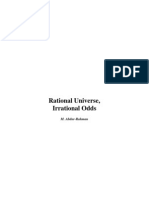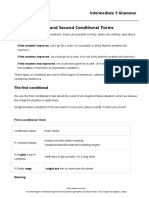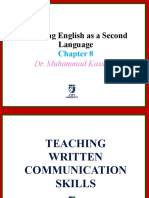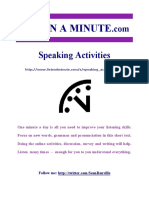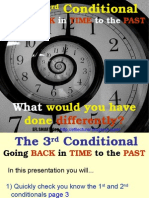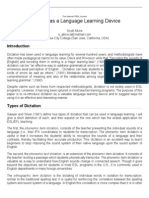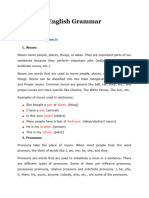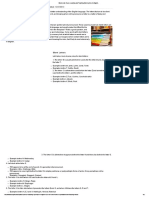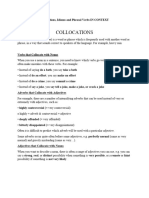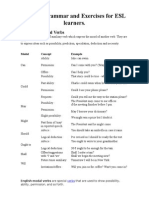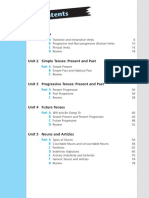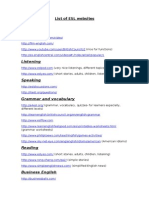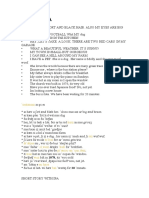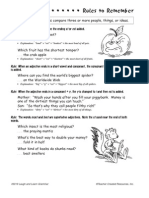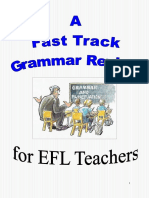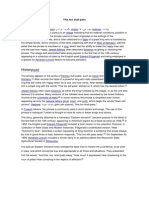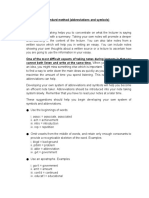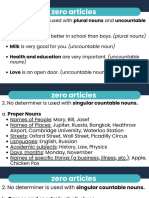Grammar
Grammar
Uploaded by
Wirun CherngchawanoCopyright:
Available Formats
Grammar
Grammar
Uploaded by
Wirun CherngchawanoCopyright
Available Formats
Share this document
Did you find this document useful?
Is this content inappropriate?
Copyright:
Available Formats
Grammar
Grammar
Uploaded by
Wirun CherngchawanoCopyright:
Available Formats
1
2
Section One:
What is grammar?
Why do I need to know about it?
Page
3-5
Section Two:
Parts of Speech
6-21
Section Three:
Phrases, Clauses and Sentences
22-32
Section Four:
The Structure of Sentences:
Parts, Agreement and Conditionals
33-40
Section Five:
Articles, Quantifiers, Verbals
and Reported Speech
41-54
Section Six:
Coordination, Subordination & More
Basic Punctuation Review
55-65
Section Seven:
Grammar Resources
where to learn more
66
INSIDE
THIS
GUIDE
3
What is Grammar?
Check all the answers that you feel are true.
A system designed to confuse students and teachers
An antiquated system of rules that no one uses anymore
An incomprehensible jumble of rules with too many exceptions
The first thing to embarrass me in the classroom
If you checked all four responses, you are not alone. This course book is
designed to get you up and running and comfortable with the basics in
just a few weeks. Here we go . . .
Section
1
The Basic Idea
Whatitis
andwhyweneedtoknowaboutit.
4
What is Grammar?
Different sources define grammar in different ways.
Merriam-Websters online dictionary defines grammar as:
1 a : the study of the classes of words, their inflections, and their
functions and relations in the sentence b : a study of what is to be
preferred and what avoided in inflection and syntax
2 a : the characteristic system of inflections and syntax of a language
b : a system of rules that defines the grammatical structure of a
language
Are you confused yet? Heres another one:
Ask Jeeves has a Quick Definition that reports
grammar as studies of the formation of basic
linguistic units.
Some grammarians also refer to descriptive and
prescriptive grammars. Descriptive grammar refers to the way
language is actually used. Prescriptive grammar is the way experts say
it should be used. Consider how you would research how to write a
language that has no writing system. First, you might listen to how
people speak the language. Then you might also ask the more educated
speakers how it should be spoken.
Perhaps the easiest way to get a good grasp of the concept is with the
TOEFL tests use of the word Structure as the name of the grammar
component of the test. Think of grammar as providing the structure
and organization for language.
Exercise 1.1.
Start thinking about a definition of grammar that is simple and useful.
Make it simple enough that you can use it to explain grammar to your
students. Write that definition here:
_______________________________________
_______________________________________
_______________________________________
When you finish this book, return to this exercise and see if you wish to
improve your definition, or leave it as it is. If you have improved it,
write it here:
_______________________________________
_______________________________________
_______________________________________
Section
1
5
Why do I need to know grammar?
Check all the answers that you feel are true.
so I dont get embarrassed in the classroom
because it is an important part of learning English
so I can explain it to my students when they ask about it
to help increase my confidence level in the classroom
Once again, if you checked all the answers, no need to worry.
Most new teachers have all these concerns and more.
The Most Important Reasons
Professional:
A taxi driver needs to know his/her way around town. You need to know
your way around grammar. Grammar is an important part of most EFL
programs. You need a good grasp of grammar and to know how to
explain it simply and clearly to your students.
Student Expectations:
Your students will expect you to have an in-depth understanding of
grammar, and will quickly lose confidence in you if you cant deliver.
Confidence:
When you are standing in front of a
classroom of five, ten, or even
twenty or more students, youll be
much more confident when those
grammar questions show up. When
you least expect it, students can ask
you the most obscure questions,
often in front of a large classes.
Wont you feel a lot better knowing
you have put in the effort to
communicate the basics in a
professional and effective manner?
Last of all, remember that EFL students or their parents, often pay what
is for them, a very large amount of money for English lessons.
Do a good job for them and deliver the value and quality education
they deserve.
Section
1
6
Word Classification
accordingtogrammaticalfunction
Section
2
2.1 How many parts of speech are there?
Check the box with the correct answer
8
9
10
12
What are the parts of speech?
Write their names on the lines below
__________________________________________________
__________________________________________________
__________________________________________________
What part of speech is the word the?
Write the answer below
_______________
Find the answers on the bottom of the next page
7
How many parts of speech are there?
It depends on who you ask. Depending on your source, you
will find anywhere from eight to nine or even more!
Confused yet? Maybe you should be. But, most of all, dont be intimi-
dated by it. Remember if you write the book, you get to decide how
many parts of speech there are and it is only a matter of classification or
how they are sorted into categories. Some grammarians avoid the
subject altogether by not even addressing the issue.
What are the parts of speech?
There is fairly common agreement about nine parts of speech: nouns,
pronouns, verbs, prepositions, adverbs, adjectives, conjunctions,
articles, and interjections. On some lists you will also find determiners
instead of articles (articles are in this class) and possibly quantifiers,
most of which can also be classed as determiners. Its important to
know that many words can be used as more than one part of speech.
Their classification will depend on how they are used in a sentence.
What is a noun?
A noun is a part of speech that represents the name of a person, animal,
place, thing, quality (such as kindness), action (reading), or
measurement (hour, kilogram).
Nouns can be categorized as very specific proper nouns - which are
capitalized and typically used without an article,
and more general common nouns - which are
typically accompanied with a determiner.
Nouns may also be classified as countable and
uncountable (sometimes called count and non-
count nouns). Countable nouns can have a
plural form.
There are also collective nouns. These names
are for groups, such as committee, government,
team, jury, family, etc.
What is a pronoun?
The most simple forms of pronouns (personal pronouns) substitute for
nouns and noun phrases. They can be further classed as first, second,
and third-person pronouns (me, you, them). They can also be classified
by case as subjective or objective (used as the subject or object of a
sentence). Examples: I vs. me; she vs. her; they vs. them.
Pronouns representing noun phrases can make speech or writing easier
by representing much longer passages and ideas with a simple pronoun.
Section
2
H o w m a n y p a r t s o f s p e e c h ? U s u a l l y n i n e , s o m e t i m e s e i g h t , o t h e r t i m e s m o r e . T h e y a r e u s u a l l y n a m e d a s : n o u n s , p r o n o u n s , a d j e c t i v e s ,
a r t i c l e s , v e r b s , a d v e r b s , c o n j u n c t i o n s , p r e p o s i t i o n s , a n d i n t e r j e c t i o n s .
T h e i s u s u a l l y c l a s s i f i e d a s a n a r t i c l e , b u t c a n a l s o b e c l a s s i f i e d a s a n a r t i c l e o r a d e t e r m i n e r .
8
Demonstrative pronouns are pronouns such as this, that,
these and those, which by their very use indicate or
demonstrate what is being talking about. Example: I want
those. If they are used in front of a noun, they are called
demonstrative adjectives. Example: I want those pencils.
Possessive pronouns indicate ownership. That car is hers. It is mine.
If a pronoun is used to indicate to whom an object belongs, it is called a
possessive adjective. Example: That is her car. Some grammarians
would classify such use as determiners, not adjectives.
Reflexive pronouns indicate that the subject receives the action of the
verb. Example: I treated myself to a big piece of chocolate cake.
Intensive or emphatic pronouns strengthen the action of the subject.
Example: Ill do it myself.
Interrogative pronouns introduce questions - which,
what, who, whom, and whose are examples. Who did
that?
Relative pronouns are used to tie together related
groups of words. Examples are which, what, who,
whom and whose. I went to the doctor that my friend
recommended.
What is an article?
Sometimes called a noun marker, sometimes classed
as a determiner, articles precede nouns. A and an are called indefinite
articles, the is called the definite article.
How about determiners?
Determiners are a broader class of words than articles and include most
quantifiers. Determiners can be defined as words that begin noun
phrases and help limit or specify the nouns they precede. This class of
words would also include possessive and demonstrative adjectives.
Examples include a, the, your, this, each, several, some.
Quantifiers?
As long as we have stepped in these waters, lets finish it with
quantifiers. They are simply words that precede nouns that give some
indication of how many or how much of a noun we are talking about.
Examples include few, little, many, much, a lot, several. Quantifiers are
typically classified as determiners. In a system in which determiners are
not used, quantifiers would typically be classified as adjectives.
Section
2
9
What are Adjectives?
Adjectives are words that describe nouns and pronouns.
They give us more information about them.
She is hungry. The big red car is beautiful.
Possessive adjectives do that by telling us who the noun belongs to:
It is my car.
Demonstrative adjectives do it by telling us which
nouns we are talking about: I want those pencils.
Adjectives are sometimes said to modify or limit
nouns. They modify or limit them by making it more
clear which one or how many are being talked about:
I want only one large egg.
In classification systems with only eight parts of
speech, articles are typically classified as adjectives.
2.2 Classify These Words
Write the name of the part of speech on the blank line.
Be as specific as possible, name more than one class if possible.
(answers are below)
1. Id like those eggs, please. _____________________________
2. Who did that? _______________________________________
3. Many students dont enjoy studying. _____________________
4. Thats my car. _______________________________________
5. Our football team won the game. _________________________
6. San Francisco is a beautiful city. _________________________
7. He did it himself. _____________________________________
8. The cat in the hat. ____________________________________
Section
2
1 . d e m o n s t r a t i v e a d j e c t i v e 2 . i n t e r r o g a t i v e p r o n o u n 3 . q u a n t i f i e r / a d j e c t i v e 4 . p o s s e s s i v e a d j e c t i v e
5 . c o l l e c t i v e n o u n 6 . p r o p e r n o u n 7 . i n t e n s i v e o r e m p h a t i c p r o n o u n 8 . a r t i c l e , d e t e r m i n e r , a d j e c t i v e
10
What is a Verb?
Verbs are words that express action (run) or a state of being
(love). The action can also be abstract rather than visible,
such as the words think and decide.
Verb Tenses what are they, how do they work?
Verb tenses are the twelve categories of verb usage that are related to
the time at which something happens and its duration.
2.3 Classify the following verb forms - pretest
(see answers below)
1. Had run >_______
2. Had been running >_______
3. Will have been running >_______
4. Ran >_______
5. Runs >_______
6. Will have run >_______
7. Was running >_______
8. Has run >_______
9. Has been running >_______
10.Will be running >_______
11.Will run >_______
12.Is running >_______
How do the Verb Classifications Work?
These twelve classifications are all time related. Six are simple and six
are continuous or progressive forms (continuous or progressive may be -
and often are - used interchangeably here). Simple forms are used
when we view the action or state as being complete. The continuous or
progressive form is used when the action or state is seen as being
incomplete.
Examples:
I think so. Simple form - the subject has taken a
position and is not continuing to consider
or evaluate it.
I am thinking about it. Progressive form - the subject continues to
evaluate or consider the issue at hand. His
evaluation is not yet complete.
Section
2
A. present simple
B. Present progressive
C. Past simple
D. Past progressive
E. Future simple
F. Future progressive
G. Present perfect simple
H. Present perfect progressive
I. Past perfect simple
J. Past perfect progressive
K. Future perfect simple
L. Future perfect progressive
1 . I 2 . J 3 . L 4 . C 5 . A 6 . K 7 . D 8 . G 9 . H 1 0 . F 1 1 . E 1 2 . B
11
There are also six perfect and six non-perfect forms. The
perfect forms are used when the actions being talked or
written about looks back into the past (from the speakers
perspective - this is important).
Examples:
I am talking. non-perfect form: The action is
happening right now.
I have been talking. perfect form: The action began
in the past and continues into
the present time.
When we mix the simple and continuous forms with the
perfect and non-perfect forms and use them to talk
about the past, present and future, we end up with the
twelve major verb tenses we will focus on in this text.
Present Simple: The most basic and simple form of the verb. Think,
run, talk, sleep, and work are all examples. This form is generally used
to talk about present time and expressive habitual action and things that
are believed to be true. The easiest way to remember this is as fact
and habit. You will see this tense expressed as present simple in some
texts and as simple present in others. Use it the way your students are
most familiar with.
Examples:
I brush my teeth everyday. This is my daily habit.
My teeth are very clean. I believe this to be true.
On a time line this tense can be expressed as being now.
Past Simple: This tense denotes past time - an action or condition that
was completed in the past.
Section
2
past now future
12
Examples:
I was sick yesterday.
I ran five miles every day when I was young.
The condition (sick) and the action (ran) occurred and were completed
sometime in the past.
Future Simple: This tense is used to denote future time - an action or
condition that will occur in the future. The future is expressed using will
+ the base form of the verb (or simple unchanged form).
Examples:
I will be tired tomorrow.
I will run five miles every day when I get old.
The condition (tired) and the action (run) will occur and be completed
sometime in the future.
Progressive Forms:
These forms use a structure of be + main verb + ing
Present Progressive: This tense is used to denote an action or
condition that began in the past and continues into present time.
Examples:
I am feeling sick today. This condition began sometime earlier and
continues even now.
I am studying French. I study French, but I started sometime in
the past - and I continue to study it now.
The condition (sick) and the action (study) both started in the past and
continue at the present time.
Section
2
past now future
past now future
13
On a time line present progressive looks like this:
Past Progressive: This tense is used to denote an action or condition
that began in the past and was completed prior to the present time.
Examples:
I was feeling sick yesterday. This condition began and ended
sometime earlier - I am no longer
sick.
I was studying French. I studied French. I started sometime
in the past, but I dont study it now.
The condition (sick) and the action (study) both started and stopped in
the past and do not continue at the present time. It is clear also that the
speaker could have used the past simple form to provide the same
meaning. It is the speakers choice and in this case
the speaker may have wanted to stress that
something else was happening (or happened) at the
time.
Examples:
I was feeling sick yesterday, so I went to the doctor.
I was taking a shower when the phone rang.
On a time line past progressive forms look like this:
I was studying grammar when I got really sleepy.
past now future
Section
2
past now future
14
Future Progressive: This tense is used to denote an action
or condition that will be taking place sometime in the future.
Here we must add will to the standard progressive form of
be + main verb + ing.
Examples:
I will be feeling sick tomorrow. This condition will begin in the future
and continue for an unspecified or
unknown period of time.
I will be studying French soon. I will study French in the future and
will continue for an unspecified or
unknown period of time.
Note again that the speaker could have used the future simple form, but
chose to use the future progressive form. This is the speakers choice
and s/he may chose this form to emphasize another action or condition.
On a time line future progressive looks like this:
The Perfect Simple Forms:
Perfect simple forms use the following structure: have + past participle
of the verb. Perfect forms are generally used to express the time
relationship between two events or conditions.
Present Perfect Simple: This form denotes action that is completed at
the time of speaking or writing, but may also indicate action that is
continuing into the present.
Examples:
I have felt sick for two days. This condition began in the past
continues into the present.
I have studied French for Study began in the past and
a long time. continues to the present time.
I have studied enough! My study began in the past and
continues to the present time but
is stopping now.
Section
2
past now future
15
On a time line the present perfect simple form looks
like this:
Past Perfect Simple: This form is used to denote the relationship of two
events or conditions that occurred in the past. It uses the same form as
the present perfect simple, but uses the past form of have - had.
Examples:
I had been sick for two days I was sick before I went to the doctor.
when I went to the doctor.
I had studied French for a long I studied French first.
time before I traveled to France. I went to France second.
They had sold all the tickets The tickets were sold out first.
before I got there. I got there second.
On a time line the past perfect simple form looks like this:
Future Perfect Simple: This form establishes the time relationship
between two conditions or actions that will occur and be completed in the
future. The structure is will + have + past participle.
Examples:
By the time I get to Chiang Mai, I am going to walk to
I will have walked 500 kilometers. Chiang Mai. When it
is all done - 500km
will have been walked.
I will have completed my studies When I leave Phuket,
by the time I leave Phuket. my studies will have been
completed.
past now future
Section
2
past now future
16
On a time line future perfect simple looks like this:
The Perfect Progressive Forms
Perfect progressive forms use the following structure:
have + past participle of be + main verb + ing.
Present Perfect Progressive: This tense is used to show that an
action or condition that began in the past is continuing into the present
and/or future.
Examples:
I have been feeling sick for two days.
I have been studying French for a long time.
Both of these examples indicate the condition or action began in the past
and continues at the present - and may continue into the future.
On a time line Present Perfect Continuous looks like this:
Past Perfect Progressive: This tense is used to denote and action or
condition that began in the past and was interrupted
by another action or condition.
Examples:
I had been feeling sick for two days, when suddenly
I felt better.
I had been studying French for a long time, then I
just gave it up.
Section
2
past now future
past now future
17
Both of these examples indicate the condition or action
began in the past and was interrupted by something else.
On a time line Past Perfect Continuous looks like this:
Future Perfect Progressive: This tense is used to indicate that an
action or condition will continue until a specific time in the future.
The form for this tense is will + have + been + main verb + ing
Examples:
By the time I get to France, I will have been studying
French for two years.
By the time I get married, I will have been looking
for a wife for a long time.
Both of these examples indicate the condition or action
will continue until (at least) a specific time in the future.
On a time line Future Perfect Continuous looks like
this:
Okay, this has been pretty exciting, but I think it is time for a break.
past now future
Section
2
past now future
18
2.4 Classify the verb tenses in the
following sentences
1. By the time I finish studying grammar, I will be an old man. _______
2. I love sushi! _______
3. I went to Koh Phuket last year and really loved it. _______
4. Ramon had been planning to buy an airplane, after he finished his
pilot training, but he ran out of money._______
5. By the time I finish my TEFL certification
course, I will have been sitting in a classroom
far too long. _______
6. My dog has been walking to work everyday
since he was just a pup. _______
7. He will be walking to work for the rest of
his life. _______
8. Jennys Alfa Romeo was running poorly by the time she drove back to
Chiang Mai. _______
9. My student had talked me out of an F, so I gave him a D. ______
10. I hope that when I die, I will have lived a good enough life to come
back next time as a sea otter. They really enjoy life! ______
11. Most teachers are making so much money that they dont know
what to do with it all! True or False? _______
12. Big bucks! Big bucks! I have earned big bucks
this year! _______
Measure your expertise!
TEFL Genius: 12 correct
Pretty d*mn smart: 10-11
Know it all: 9
Party Guy/Gal: 7-8
Back to the books!: 0-6
Section
2
1 . f u t u r e s i m p l e 2 . p r e s e n t s i m p l e 3 . p a s t s i m p l e 4 . p a s t p e r f e c t p r o g r e s s i v e
5 . f u t u r e p e r f e c t p r o g r e s s i v e 6 . p r e s e n t p e r f e c t p r o g r e s s i v e 7 . f u t u r e p r o g r e s -
s i v e 8 . p a s t p r o g r e s s i v e 9 . p a s t p e r f e c t 1 0 . f u t u r e p e r f e c t 1 1 . p r e s e n t p r o g r e s -
19
What is an Adverb?
Adverbs are modifiers of verbs and adjectives and other
adverbs. They generally answer questions about when
(tonight), where (downtown), how (carefully), in what
manner (quickly), and to what extent or degree (very).
Remember earlier we said some words can have several functions?
Notice here that you would ordinarily think of downtown as a noun, but if
we use it in the sentence: Please meet me downtown tonight, then
downtown tells us where and is functioning as an adverb. So is tonight
as it says when. Nouns that can express time, place, size,
measurement, degree or number are often used as adverbs.
Examples:
Lets go home.
Leopards can run through the night very quickly.
Home tells us where (part of the definition of an adverb).
Quickly is an adverb as it tells us to what manner the leopard runs and
very is an adverb as it tells to what degree (very quickly) and it modifies
the adverb quickly.
Interrogative Adverbs are used at the beginning of a sentence to form
a question. These adverbs are when, where and how. These make
sense if you revisit the definition of an adverb above.
Examples:
When did you get here?
Where are going tonight?
How long were you gone?
What are Prepositions?
Prepositions denote relationships between certain words in a sentence.
Prepositions are placed before a noun (or the article/quantifier preceding
the noun) and helps establish a relationship between that noun and
another noun or between that noun and a verb.
The book is on the table establishes the
relationship of the book to the table. Bobs car
fell off the bridge establishes the relationship of
the verb fell to Bobs car. Notice that this
prepositional phrase off the bridge is working as an
adverb. The phrase says where the car fell.
Uh-oh, things can get complicated from here . . .
Section
2
20
What are Conjunctions?
In Latin conjunction means join together and thats what
conjunctions do. They join words together. The most
commonly used conjunctions are and, or and but. Well talk about
others later in this guide.
Examples:
I am hot and tired, but still ready to party!
Oscar jumped into the pool and swam to the other side.
You can have the cash or the prize.
What are Interjections?
Interjections are used to express strong feeling or emotion, usually that
occur quickly. Sometimes called exclamations, youll notice they always
come with an exclamation mark.
Examples:
Ouch!
Great!
Oh no!
Oh no! We are finished with the parts of
speech section! What will we do for
entertainment now?
2.5
Classify the underlined words in the sentence below.
(mark the part of speech under each wordbe as specific as possible)
It was way after midnight when we finally got Raoul to confess that he
had planned the most successful bank robbery ever on Mars.
How did you do?
Section
2
I t , p r o n o u n ; w a y , a d v e r b ( t o a g r e a t d e g r e e ) ; m i d n i g h t , a d v e r b ( w h e n ) ; R a o u l , p r o p e r n o u n ; c o n f e s s , v e r b ( p r e s e n t s i m -
p l e ) ; t h a t , c o n j u n c t i o n ; h a d p l a n n e d , v e r b ( p a s t p e r f e c t s i m p l e ) ; t h e , a r t i c l e ; m o s t , a d v e r b ( t e l l i n g h o w s u c c e s s f u l - d e -
g r e e ) ; s u c c e s s f u l , a d j e c t i v e ; e v e r , a d v e r b ( w h e n ) ; o n , p r e p o s i t i o n ; M a r s , a n o u n w o r k i n g a s a n a d v e r b ( t e l l i n g w h e r e )
21
2.6 Classify the underlined words in
the sentences below.
(Mark the part of speech - and verb tenses - under each word. Be as specific as possible)
1. International schools often pay more than language schools.
2. As a career, TEFL opens many international doors.
3. What do you intend to do with your TEFL certification?
4. I had started teaching EFL before my 39th birthday.
5. Many trials and tribulations await the classroom teacher.
6. When Ted turns 35, he will have been teaching for ten years.
7. I was already teaching when you were still a baby.
8. If I had started teaching when I was younger, I would have
saved a lot more money.
9. How is it that life can be so rewarding, yet so challenging?
10. When the tsunami struck, I was sleeping on the couch.
Are you man (or woman) enough
to handle it?
1 . f r e q u e n c y a d v e r b , a d j e c t i v e 2 . p r e p o s i t i o n , i n d e f i n i t e a r t i c l e 3 . p r o n o u n , n o u n 4 . v e r b p h r a s e : p a s t p e r f e c t ,
p o s s e s s i v e a d j e c t i v e 5 . a d j e c t i v e , v e r b : s i m p l e p r e s e n t 6 . p r o p e r n o u n , v e r b p h r a s e : f u t u r e p e r f e c t p r o g r e s s i v e
7 . v e r b p h r a s e : p a s t p r o g r e s s i v e , v e r b : p a s t s i m p l e 8 . v e r b p h r a s e : p a s t p e r f e c t ( t e a c h i n g i s a g e r u n d h e r e ) , v e r b
p h r a s e : p r e s e n t p e r f e c t 9 . a d v e r b ( t o w h a t e x t e n t o r d e g r e e ) , a d j e c t i v e ( p a r t i c i p i a l a d j e c t i v e ) 1 0 . i n t e r r o g a t i v e
a d v e r b , d e f i n i t e a r t i c l e
22
The Building Blocks
of Language
Which of the following groups of words are phrases,
clauses, or sentences?
(mark them with a P, C, or S)
_____1. What time is it?
_____2. on the table
_____3. on the way to the bank
_____4. We talk.
_____5. Because I am tired
_____6. When I get there
_____7. run
Section
3
1 . S 2 . P 3 . P 4 . S 5 . C 6 . C 7 . n o n e o f t h e c h o i c e s
23
Lets start by defining what we
are talking about
What is a phrase?
A phrase is two or more related words that work together that do not
contain a subject and a verb.
Examples: in jail big monkey running slowly
When we talk about phrases we can include: prepositional phrases (that
can work as adjectives and adverbs), adverbial phrases (adverbials),
noun phrases, verb phrases (phrasal verbs), verbals (participial, gerund,
and infinitive), and compound phrases. Wow! More on these later.
What is a clause?
A clause is two or more words related words that work together that con-
tains a subject and a verb. Compare this definition to that of a phrase.
There are two types of clauses: one called independent (or main) which
can stand alone as a sentence; and two, dependant (or
subordinate) which can not stand along as a complete sentence.
Examples:
Because he was crazy dependent clause
The monkey is rabid independent clause
Dependent clauses serves many purposes and can be classified a
variety of waydepending on who you readas relative, participial,
adjectivial, adverbial, noun, and elliptical. More detail on these later.
What is a sentence?
A sentence is a group of words that express a complete thought. While a
simple definition, similar ones being used in many reference books, what
is a complete thought? Some definitions will say that it must have a
subject and verb and final punctuation. Look up several definitions in
reference booksand try to find one that you will feel most comfortable
with and able to explain, in simple English, to your students.
Examples:
I want to go home now.
When is the next movie?
Section
3
24
Notice that a sentence is a main or independent clause.
Sentences can be broken into subject and predicate parts.
They can be classified as simple, compound, complex and compound-
complex sentences.
Depending on the purpose of the sentence they can also be classified as
declarative, interrogative, imperative, and exclamatory sentences.
More on the variety of possible classifications later.
Phrases
Phrase classifications that we need to become familiar with include:
prepositional phrases (that can work as adjectives and adverbs), noun
phrases, verb phrases (phrasal verbs), verbals (participial, gerund, and
infinitive), and compound phrases.
What is a prepositional phrase?
A prepositional phrase (PP) opens with a preposition and ends with a
noun or pronoun (the object of the phrase). A PP functions as a
multi-word adjective phrase (adjectival) or adverb phrase (adverbial).
The prepositional phrase as an adjective:
Examples:
The monkey in the red hat . . .
helps describe the monkey
The man with the organ . . .
helps describe the man
The prepositional phrase as an adverb:
Examples:
She dances with grace and style. describes how she dances
The hair on his back grows quickly
and with great vigor. describes how
his hair grows
His is afraid of his own shadow. Modifies the
adjective afraid.
These type of prepositional phrases are sometimes called
adverbials or adverbial phrases.
Section
3
25
A common point of confusion is that prepositional phrases
that tell where can work either as an adjective or an adverb
depending on if it is modifying a noun or verb.
Examples:
Adjective:
The monkey next to the man plays the organ well.
This PP says where the monkey is in relation to the man.
Adverb: He works at home. This PP says where the man works.
Noun and Verb Phrases
Noun phrases are groups of words that act as the subject, object or
complement of a clause or sentence.
Examples:
The red Ferrari is mine.
That monkey is playing a large purple organ.
Verb phrases (or Phrasal Verbs) are multi-word verbs, usually
a main verb followed by preposition.
Examples: take off, run out of, fill up
The hat on the monkeys head bounced with the beat of the music.
A B C
The last bus to Chiang Mai leaves from the station at midnight.
D E F
Luckily, I took off my shirt before the Jello fight started.
G H
Section
3
A . P P w o r k i n g a s a n a d j e c t i v e ( m o d i f i e s h a t ) B . P P w o r k i n g a s a n a d v e r b ( m o d i f i e s b o u n c e d ) C . P P w o r k -
i n g a s a n a d v e r b ( m o d i f y i n g t h e a d v e r b p h r a s e w i t h t h e b e a t ) D . n o u n p h r a s e E . P P w o r k i n g a s a n a d v e r b
( l e a v i n g f r o m w h e r e ? ) F . a d v e r b ( l e a v i n g w h e n ? ) G . P h r a s a l v e r b H . a d v e r b ( w h e n I t o o k o f f m y s h i r t )
26
Verbal Phrases
A verbal is verb form working as another part of speech.
The verbal and the other words related to it are called a
verbal phrase. There are three types, called participial phrases, infinitive
phrases, and gerund phrases.
Participial Phrases use the present or past participle form of a verb
and function as adjectives.
Examples:
Shaken by her fear of ghosts,
McGillacuddy ran wildly into the night.
Later, we found her drenched in sweat
and trembling with fear.
Gerund Phrases use the present participle form of a verb and function
as a noun.
Examples:
Running every day is the best way to stay in shape.
Getting my hair cut is a chore I hate.
Infinitive Phrases use the infinitive form of a verb and function as
nouns, adjectives and adverbs.
Examples:
To live a full life is the goal of many an adventurer.
Ramon had no choice but to study grammar every night if he wished to
pass the examination.
Section
3
27
Clauses
A clause is a group of words that contains a subject and a verb.
An independent or main clause can stand alone as a sentence.
A dependent or subordinate clause can not.
The famous Santa Clause is more fun and can stand alone.
Example:
When I started running, I was really out of shape.
subordinate clause independent clause
When I started running can not stand on its own. It has a sense of being
incomplete, but I was really out of shape is fine on its own.
Dependent Clauses
Depending on its function in a sentence, a clause may be classified as an
adjectival, adverbial, noun, or elliptical.
What is an adjectival (relative) clause?
This is a clause that acts as an adjective - so it describes a noun or
pronoun. Some begin with a relative pronoun: which, what, whatever,
who, whose, whom, whoever, whomever, or that. Others begin with a
relative adverb: when, where, before, since, or why.
To avoid confusion, adjectival clauses should be
placed as close as possible to the noun they describe.
Examples:
Thats the guy who invented the bungee jump.
This is the house that I told you about.
Subordinate (dependent) clauses that begin with
who can be classified as identifying (restrictive) or
non-identifying (non-restrictive) relative clauses.
Section
3
28
Examples:
This is Jim Bungee, who invented the bungee jump.
(non-indentifying as we already know who he is)
This the guy who invented the bungee jump.
(indentifying as we dont know who he is until specified)
Notice the comma in the sentence with non-identifying clause.
More on relative clauses later in the guide.
What is an adverbial clause?
We can easily guess that this clause acts as an adverb, so it describes a
verb, adverb or adjective.
Adverbial clauses always begin with subordinating conjunctions.
Examples include before, since, after, because, when, and if.
A more complete list of conjunctions can be found later in this guide.
Examples:
Because Jeff was so angry, he couldnt concentrate on
his studies.
When I finished the TEFL course, I landed a great job.
What is a noun clause?
A noun clause is a group of words that function as a noun - and play the
role of the subject, object, or complement of a sentence. These clauses
usually begin with a relative pronoun or how, why, when, if, or whether.
Examples:
Whether you like grammar or not doesnt matter. (subject)
The prize will be won by whoever gets the job done first. (object)
What is an elliptical clause?
Since ellipsis means leaving something out - we can guess that these
clauses have something missing. As a result they may be grammatically
incomplete but their meaning will still be clear.
Section
3
29
Examples:
She is as old as I (am).
Though (he is) seventy years old,
Ted is still quite frisky.
And now, finally . . .
Sentences
We covered the definition of a sentence back on page 23 so here well
add information about sentence functions and structures.
Functions:
We use sentences to make statements - called declarative sentences -
(He is crazy.), to make commands - called
imperative sentences - (Close the door.), to
make interjections - called exclamatory
sentences - (Ouch!), and ask questions -
called interrogative sentences - (Whats
your name?).
The structure and complexity of a sentence is
classified in the following ways: Simple
sentences, compound sentences, complex
sentences, and compound-complex
sentences.
Dont worry, we can make sense of all this
before sundown . . .
What is a simple sentence?
A simple sentence has a subject and a verb in one clause. The subject
and/or verb may be compound (more than one verb and/or subject).
Example:
Jane and Bill talked and walked for hours. simple sentence
(compound subject) (compound verb)
Section
3
Ouch! This is killing me!
30
What is a compound sentence?
A compound sentence is formed by joining together two or
more independent clauses. They are often joined together with a
conjunction.
Examples:
Jim likes to dance. He doesnt know how.
Jim likes to dance but he doesnt know how.
He got an A+ on the exam. He was cheating.
He got an A+ on the exam; however, he was cheating.
You can pay me now. You can pay me later.
You can pay me now or you can pay me later.
What is a complex sentence?
These sentences contain at least one independent clause and at least
one dependent clause.
Examples:
When Fredo returned home late that night. Fredo was broke.
Fredo was broke when he returned home late that night.
or
When Fredo returned home late that night, he was broke.
Because Mars is so hot at night. Zark didnt wear a coat.
Because Mars is so hot at night, Zark didnt wear a coat.
or
Zark didnt wear a coat because Mars is so hot at night.
Section
3
31
What is a compound-complex sentence?
These sentences have at least two independent clauses (the
compound part) and at least one dependent clause (creating the
complex part).
Examples:
When I dont have any money.
I start to worry.
I should look for a new job.
When I dont have any money,
I start to worry that I should look for a new job.
Because my dog was sick.
I took him to the vet.
I got my dog a shot.
Because my dog was sick,
I took him to the vet and got him a shot.
Sentences Quiz
Are the following sentences simple (S), compound (C), complex (CX), or compound-complex (CCX)?
1. Zark is hot.
2. When Derrick got home Belinda was really angry.
3. What time is it?
4. How can you be successful, when you dont know anything?
5. Songkran is one big giant water fight.
6. Reynaldo ran out of money so he went home.
7. Because Samui was so crowded, we bought bus tickets and then we
went to Phuket.
8. It started raining just as we got to bus station.
9. I want to travel the world because it is so interesting.
10. The customs guys fined me and they yelled at me for an hour
because I forgot to declare the three bottles of vodka in my suitcase.
11.I want to get a TEFL certificate and then I want to teach all around
the world.
Section
3
1 . S 2 . C X 3 . S 4 . C X 5 . S 6 . C X 7 . C C X 8 . C X 9 . C X 1 0 . C C X 1 1 . C
32
The Section 3
Super Quiz
Check back through the previous pages of Section 3
and classify each of the following phrases, clauses, and sentences.
1. on the beach
2. When I get home.
3. When did you get here?
4. I want the puppy in the window.
5. A nicotine patch is a good way to quit smoking because they help
wean you off cigarettes.
6. Riding a motorcycle is a great way to get around outside Bangkok.
7. Traveling on a screamingly fast motorcycle is great fun, and scary.
8. Grammar was so confusing that I just wanted to throw up.
9. He drives his Alfa Romeo with great style and verve.
10. I need to fill up the gas tank before we head out for Chiang Mai.
Section
3
1 . p r e p o s i t i o n a l p h r a s e
2 . d e p e n d e n t c l a u s e .
3 . s i m p l e s e n t e n c e , i n d e p e n d e n t c l a u s e
4 . P P a s a n a d j e c t i v e 5 . d e p e n d e n t
( s u b o r d i n a t e ) c l a u s e 6 . G e r u n d p h r a s e
7 . G e r u n d p h r a s e 8 . C o m p o u n d s e n t e n c e
9 . A v e r b i a l , P P a s a n a d v e r b .
1 0 . b o t h a r e p h r a s a l v e r b s
33
Pretest
Answer the following questions
Identify the underlined sentence component as subject (s),
predicate (p), or complement (c)
1. After the party, Ian took a taxi home. _____________
2. Robert is a very handsome guy. _____________
3. Jung Ah loves foreign foods. _____________
Correctly reorder the adjectives
4. The blue big cotton shirt fit my puppy poorly. _______________
5. The Australian EFL middle-aged teacher was rich.
_________________________________
Rewrite the following sentences with correct subject verb agreement.
6. One of his cars are red. _______________________
7. A majority of the students is destined to fail their physics class.
_________________________________________________________________________
Section
4
Putting it all Together:
Components, Patterns,
Agreement, Conditionals,
Order and More
1 . S 2 . . C 3 . P 4 . b i g b l u e c o t t o n 5 . m i d d l e - a g e d A u s t r a l i a n E F L 6 . . . . i s r e d . 7 . . . . a r e d e s t i n e d .
34
Sentence Structure + Components
Well use simple sentences to illustrate some basic ideas
about sentence structure. A simple sentence has a subject
and a main verb. It may also contain a describing phrase
(or complement).
What is a subject? What is a verb?
A subject is the noun or pronoun that identifies the person, place, or
thing the sentence is about. The verb tells the action done by the
subject or explains its condition.
Examples:
Subject Verb
She studies.
He runs.
My dog is a Lothario.
My dog and cat are dancing.
What is a complement?
A sentence may also have a describing phrase
(or complement), but it does not have to have one. A describing
phrase or complement gives additional information about the meaning
about the subject or verb.
Following are examples of simple sentences with describing phrases
(or compliments). Note that the complements or phrases can function
as adjectives, adverbs, pronouns, and nouns.
Subject Verb Describing Phrase
or Complement
He loves her. (pronoun)
Her new car is super fast. (adjective phrase)
Her major was English Literature. (noun phrase)
She runs fast. (adverb)
She owns her own tour business. (noun phrase)
A complement can also be a verb phrase or a prepositional phrase.
His girlfriend wants to buy a new car. (verb phrase)
Professor Lee is in the classroom. (prepositional phrase)
Section
4
35
You may also combine descriptive phrases.
He wants to start a new business on the Internet.
(verb phrase + prepositional phrase)
Joanne bought a new car yesterday. (noun phrase + adverb)
Write three descriptive sentences below.
1. __________________________________________________________________________
2.__________________________________________________________________________
3.__________________________________________________________________________
Sentence Structure: Subject-Verb Agreement
A singular subject must be followed by a singular verb, and a plural
subject must be followed by a plural verb. This rule is called subject-
verb agreement.
Examples:
Her book is missing. (singular)
Her books are missing. (plural)
Her books and pens are missing. (plural)
Generally agreement is not a difficult issue, but it can be when dealing
with certain terms and or terms + prepositions. Well try to cover
most of themjust for good reference.
Each and every, when used with a singular noun, should be followed by
a singular noun.
Examples:
Each pencil is of the highest quality. (singular)
Every pencil is of the highest quality. (singular)
The following subject nouns require a singular verb.
everyone, anyone, someone, no one,
everybody, anybody, somebody, nobody,
everything, anything, something, nothing
Section
4
36
Examples:
Everyone is going to the party tonight. (singular)
Anything is better than nothing at all. (singular)
Something is wrong. (singular)
Someone came by to see you. (singular)
It is difficult sometimes to decide if a subject is
singular or plural. This is especially true when there
is additional information following the subject, but
before the verb. The additional information is often
written in a prepositional phrase.
A prepositional phrase connects a subject to the
rest of the sentence and usually tells where, when,
how, or why. Thus a prepositional phrase works as an
adverb or adjective.
Examples:
at my house at noon
of my friends on Monday
on the edge of town of books
on the chairs under the table
A prepositional phrase often comes after the subject of a sentence, but
before the verb. The phrase is not a part of the subject, so it should not
be used to determine for the form of the verb.
Examples which use singular verbs:
None of my friends is a student. The subject none is singular.
One of his cars is red. The subject one is singular.
Each of them wants to come. The subject each is singular.
Phrases referring to amounts, measurements, and
quantities use a singular verb.
Examples:
Five hundred baht is all I have.
The number of people here tonight is frightening!
Three tablespoons of mocha is all I need.
Section
4
37
Examples which use plural verbs:
Both of us are tired.
Several of us are going to the cinema tonight.
There are times when you will need to use the noun in the
prepositional phrase to determine the correct verb form.
This is true when using a lot, any, none, plenty, the
majority, most, some, a number, a/the majority and all. If
the noun in the prepositional phrase is a non-count noun,
you should use a singular verb. If it is a plural noun, use a
plural verb. If it is a singular noun, use a singular verb.
Following is a chart of terms and their verb requirements:
term + preposition noun verb
any of
each of
none of
either of
neither of
plural noun
singular
most of
some of
all of
a lot of
a/the majority of
a number of
plenty of
plural
plural
the number of plural singular
the majority of
most of
plenty of
all of
some of
a lot of
none of
non-count noun
singular
term + preposition noun verb
any of
each of
none of
either of
neither of
plural noun
singular
most of
some of
all of
a lot of
a/the majority of
a number of
plenty of
plural
plural
the number of plural singular
the majority of
most of
plenty of
all of
some of
a lot of
none of
non-count noun
singular
Section
4
38
Verb Agreement Quiz
Hey! Do your best!
Fill in the blanks in the following sentences.
Use the correct present simple form of the verb in parenthesis.
1. The number of students on the TEFL course _______ (have)
increased this year.
2. A lot of the problems on the test _______ (be) impossible to solve.
3. Most of my friends _______ (go) to the beach for the holidays.
4. Neither of my pets _______ (have) studied at Doggy University.
5. A majority of the voters _______ (be) not going to vote for him.
6. None of them _______(be) coming to the party tonight.
7. Each of them _______ (have) their own crazy ideas.
8. The price of the chocolate pencils _______(be) 10 baht.
9. Something _______(need) to be done about Garys hygiene.
10. None of that stinking alien coffee _______ (be) left.
Time for a quick Grammar Wacky
Percent, per cent, or % require a singular verb.
But! If they are followed by of + plural noun use a plural verb.
And, if they are followed by of + collective noun (group noun) that can
be thought of as an individual unit or a group of individuals you may
correctly use a singular or a plural noun.
Examples:
Fifty-five percent of my head aches are due to Chang beer.
Only 35% of the team want/wants to win the game!?**
Seventy-seven percent of the asking price sounds fine to me.
Percentage is differentit is a numberand requires a singular verb.
Section
4
1 . h a s 2 . a r e 3 . g o 4 . h a s 5 . a r e 6 . i s 7 . h a s 8 . i s 9 . n e e d s
1 0 . i s
** this may vary according to British or American English usage
39
Conditionals
Three (or four?) types of conditional sentences
Depending on which grammar book you reference, you will see
three or four conditional sentence types referred to. There are
actually many more than three or four but the books tend to focus
on the most common. So dont get confused when you read
about three, if you studied four - or four, if you studied three. As
long as you understand the basics, youll do just fine. Following is
one common way of describing conditional sentences. Note the verb
forms used in each instance.
The Zero Conditional - describes general truths or facts
- situations that are always true.
Form: If + present simple, + present simple
Examples: If I get angry, my blood pressure goes up.
If you melt ice, it turns to water.
The First Conditional - describes possible situations -
situations which take place if certain conditions are met.
Forms: If + present simple, + present progressive
, + may + simple present
, + future simple
, + (be) going to [future]
Examples: If the weather is good, I am going to Chiang Mai.
, I may go to Chiang Mai.
, I will go to Chiang Mai.
, I am going to go to Chiang Mai.
Unless the weather is good, I am staying home.
The Second Conditional - describes an impossible or unlikely situation.
Sometimes called the unreal because it is
used for improbable situations.
Form: If + past simple, + would + base form of verb.
Examples: If the sun burned out, it would be very cold here.
If I got rich, I would buy a house on the beach.
If cats had wings, they would fly.
Section
4
3 ?
40
The Third Conditional - is used to describe events that
have happened in the past. Sometimes
called the past conditional as it
provides a hypothetical result for past situation.
Form: If + past perfect simple, + would have + past participle
Examples: If you had studied, you would have passed the test.
If you had worked harder, you wouldnt be so poor.
With all the conditional sentence examples above you may put
the dependent conditional [if] clause after the main
[independent] clause. If you do, do not use a comma after the
independent clause.
Three other issues:
[1]The use of if is not always a conditional,
[2] other terms may be used in conditionals such as whether, provided
(that), and unless, and
[3] if may be left out of some conditional sentences.
Examples:
[1] He asked if I had been to Phuket before.
[2] Whether it rains or not, I will go to Samui next week.
[2] Unless you do your work, we wont go to the beach.
[3] (If) You really want something, youll go get it.
Conditionals Quiz
Mark the following sentences with 0, 1, 2, or 3 for their conditional form
_____1. If you do your work, you always get good scores.
_____2. If I had known he was nuts, I would not have hired him.
_____3. If lived upcountry, I would buy a bigger house.
_____4. If I had owned a motorcycle, Id have driven it to Malaysia.
_____5. If weekends were warm, we would picnic in the park.
Section
4
1 . 0 2 . 3 3 . 2 4 . 3 5 . 2
41
Grammar Odds and Ends
Pretest
Write the correct article or quantifier in the blank
1. I dont have _____ money. Sorry!
2. Jenny just went to _____ hospital.
3. He doesnt have ______ sense.
4. Leks arm may be broken. I think she needs _____ x-ray.
5. Is that _____ motorbike you bought yesterday?
6. Love is _____ essence of life.
Section
5
1 . a n y 2 . t h e 3 . a n y 4 . a n 5 . t h e 6 . t h e
Just a few more things . . .
Articles
and how to use them
Grammar authority Michael Swan, in his book Practical
English Usage (Second Edition, Oxford University Press,
1995) tells us that: "The correct use of the articles (a/an
and the) is one of the most difficult points in English
grammar." So, in this section we will try to make it as
simple and as clear as possible.
Collins Cobuild Publishers report that 8.5% of all English
communication is the, a, or an. So, if you can improve your
understanding in this area itll be a big plus for you and your
students!
When should articles not be used?
Dont use articles before a common noun in the singular if it is preceded
by:
demonstrative terms such as this, that, these or those;
possessive adjectives such as his, her, my, their, our or
your; or
When referring to:
the name of a specific mountain or island;
the name of a city, country, continent, or season; and
ones own parents (father or mother);
meals (breakfast, lunch, supper, dinner) and sports;
the names of diseases, and
after phrases such as kind of or sort of, or after whose.
Examples:
I had breakfast this morning.
That is my car.
I am from Phuket.
What about the indefinite article - a/an?
Note that when a is used, it is used before nouns that be-
gin with a consonant sound. An is used before nouns
that begin with a vowel sound. Many students incorrectly say an
university or a hour.
Example: They had to take an x-ray of his broken arm.
X-ray begins with a vowel sound and should take the article an.
Section
5
42
43
When should the indefinite articles
not be used?
Dont use a/an before:
uncountable nouns such as advice, furniture, machinery,
money and work;
nouns such as work, health and permission;
plural countable nouns such as dogs and cats; and
cardinal numbers (one, two, etc.) that precede nouns.
Examples:
The teacher gave her permission to miss class.
I bought furniture for the office today.
When should the indefinite articles (a/an) be used:
1. When referring to one specific type of person, place or thing
Example: I saw a policeman at your house yesterday.
2. Before the words trillion, billion, million, thousand, hundred
and dozenif no cardinal number precedes them.
Example: Id like a dozen pencils please.
3. Before professional titles - if not preceded by a cardinal number
Example: I need a doctor fast!
4. When referring to a member of a class
Example: A man should serve his country in the army.
5. Before exclamations beginning with what
Example: What an exciting horse race!
6. Before certain clauses and phrases such as:
Its a big problem.
Its a pity.
to keep a secret
to have an opportunity
to have a plan
to make an effort
to have an illness (common illnesses, not diseases)
Examples: I have a cold.
He made an effort to pass the class.
Section
5
44
Quickie Article Quiz
Choose a or an for each of the following terms
_____unit _____heir
_____honest person _____SAT score
_____yellow hourglass _____UFO
The Definite Article - The
What about articles in a general and specific sense?
In general, nouns do not use the when they are used in a general sense,
but if they are used in a specific sense the definite article is needed.
Note the inclusion or omission in the following examples:
1. Plural Nouns
Life is too short to spend worrying about things.
A life not lived to the fullest, is not worth living
Cats are smarter than dogs.
A dog can be a mans best friend.
2. Abstract Nouns
Love is the essence of life.
A love such as ours, makes life worth living.
3. Material Nouns
We cant live without air to breathe.
The air in Bangkok is really polluted.
Section
5
a u n i t ( y s o u n d i s a c o n s o n a n t s o u n d ) , a n h e i r ( e h s o u n d i s a v o w e l s o u n d ) ,
a n h o n e s t ( a h s o u n d i s a v o w e l s o u n d ) p e r s o n , a n S A T ( e h s o u n d i n S i s a v o w e l s o u n d ) s c o r e ,
a y e l l o w ( y s o u n d i s a c o n s o n a n t s o u n d ) h o u r g l a s s , a U F O ( y s o u n d U i s a c o n s o n a n t s o u n d )
45
4. Days, Months, Seasons
Mondays are always a bad day at work.
The Monday I was hired was a great day!
5. Names of Languages
Chinese is really difficult to learn.
The Chinese language is tonal.
6. Meals
Breakfast is my biggest meal of the day.
The breakfast I had yesterday made me sick.
7. Colors
Green is the color of my true loves hair,
in the morning, when we rise.
The blue in the sea today is beautiful!
When must the definite article (the) always be used?
1. Singular countable nouns when there is only one
the house next to mine
the sun
the Earth
Example: The house I live in is very small.
2. Occupational titles, positions, or family names
the prime minister
the Smiths
the accountant
Example: The lawyer said that I should plead, Not Guilty.
3. The names of canals, rivers, seas, oceans, deserts,
mountain ranges, groups of islands, gulfs, hotels, theaters,
and ships
Example: I took a vacation in the Rocky Mountains.
Section
5
karma
The total effect of a person's actions and conduct
during the successive phases of the person's existence,
regarded as determining the person's destiny.
pronunciation: yin guoh
left character - cause, because of
right character - fruit, result
46
4. Names of countries formed as a union of states, tribe or
provinces.
Examples: The United Arab Emirates, The United States,
The European Union, The Philippines
5. Names of Newspapers, certain books, and instruments
Examples: I read the Bangkok Post every day.
My mother reads the Bible everyday.
Lek played the trumpet while she was in high school.
6. Nouns that are made specific by some modifying phrase or clause
Examples: The ring that Gecko lost. The CD that I decided to buy.
7. Nouns which represent people, places or things that we meet, employ,
or use regularly - even if the specific persons, places or things are
unknown to our listener or reader. British and American usage
may vary here.
Examples: My husband went to the bank today.
I had to put my cat in the pet hospital.
My sister is at the market right now.
8. Singular nouns that represent a whole class
Examples: The cat is a beautiful animal.
9. Adjectives being used as a noun to form a class
Examples: The poor need our help.
The rich pay a lot of money in taxes.
The homeless are the responsibility of the government.
10. Common nouns being used as abstract nouns
Example: Sports bring out the animal in me!
11.Proper nouns only when they are qualified by an adjective, or
defined by an adjective clause
Examples: The incomparable William Shakespeare
wrote over a thousand works.
Section
5
47
Try these exercises to see if you learned everything
from this section.
_______1. We ate _______ lunch at noon.
a. the b. a c. no article
_______2. The big BMW is his _______ car.
a. the b. a c. no article
_______3. My favorite magazine is _______ Economist.
a. the b. a c. no article
_______4. She used to play _______ saxophone.
a. the b. a c. no article
_______5. My mom is really sick. Shes in _______ hospital.
a. the b. a c. no article
_______6. _______ car I drive is really old and beat up.
a. the b. a c. no article
_______7. They took _______ x-ray of her broken finger.
a. a b. an c. no article
_______8. This is _______ big opportunity for you.
a. an b. a c. no article
_______9. To pass this class, youll have to make _______ effort.
a. an b. a c. no article
______10. I need to buy _______ ten pencils for school.
a. an b. a c. no article
Dont worry!
We will finish this
grammar course soon.
1
.
c
,
2
.
c
,
3
.
a
,
4
.
a
,
5
.
a
,
6
.
a
,
7
.
b
,
8
.
b
,
9
.
a
,
1
0
.
c
Section
5
48
Quantifiers
What about QUANTIFIERS?
Students of English usually have as much trouble with quantifiers as they
do with articles. Therefore, quantifiers are introduced here as they often
act as article-equivalents when plural countable nouns or uncountable
nouns are referred to in a way that doesnt specify exactly how many or
how much, but still implies a specific group or quantity. Well look at the
most commonly used (and abused) quantifiers here.
SOME and ANY
Some and any are the most common quantifiers. Some is used with
affirmative statements and any is used with questions and negative
statements.
English speakers do not normally say:
I bought apples.
Do you have bananas?
The baby needs milk.
Are there people waiting?
Instead, they generally say:
I bought some apples.
Do you have any bananas?
The baby needs some milk.
Are there any people waiting?
MUCH and MANY, (A) LITTLE, (A) FEW, A LOT OF
A few, few, many are used with countable nouns.
A little, little, much are used with uncountable nouns.
A lot of is used with both countable and uncountable nouns.
Much and many are used with the negative and interrogative forms.
Examples: I have a little money.
I have some money.
Do you have much money?
I have many friends.
Section
5
49
Quickie Quantifier Q&A
fill in the blanks with the appropriate quantifier
some/any
1. I dont have ______ cash, how about you?
2. Lets buy ______ beer for the party tonight.
3. If youve got ______ time, we could review for the
grammar test tomorrow.
4. Ramon is a tough teacher, he doesnt have ______ patience with students.
much/many
5. I dont have ______ time for this.
6. He has so ______ excuses for his problems - I think he is just nuts.
7. Traveling around world gives you ______ exciting experiences.
a little, a few, a lot of
8. I dont have _______ money. I just have _______.
9. There is only _______ coffee left. Do you want it?
10. It only costs _______ pounds. Why dont you buy it?
Section
5
1 . m u c h 2 . s o m e 3 . s o m e 4 . a n y 5 . m u c h 6 . m a n y 7 . m a n y 8 . a l o t o f , a l i t t l e 9 . a l i t t l e 1 0 . a f e w
Lets move on to
the next section
50
Holy Moly! What are Verbals?
We can guess from the name that these are
something made from verbs - and we would be
correct. Verbals are verb forms that can function as
nouns, adjectives, or adverbs.
Just for fun, lets say there are three kinds of
verbals. Participles, gerunds and infinitives.
Well try to define them for you and get some
practical knowledge of them as their usage is often a
problem for EFL students.
Whats a participle?
A participle is a verbal that functions as an
adjective. The participles you may be most familiar
with are words like boring and bored, interesting and interested. These
are also called (depending on what reference books you read) participial
adjectives. Most people know that verbs have past participles (usually
verb + ed) , but you should know that verbs also have present
participles (verb + ing) and it is there forms that are used to modify
nouns and pronouns.
Examples: Im bored. Hes boring.
Thailand is interesting. I am interested in Buddhism.
Shopping malls are popular hangouts in Bangkok.
Long airplane flights can lead to dizzying headaches.
He accidentally stepped on some broken glass.
Many EFL students have trouble with participial adjectives and it works
best to remind them that when describing feelings about something - the
-ing form adjectives describe what caused the feeling and the ed
adjectives describe the person/people experiencing the feeling.
Examples:
The class is boring. I am bored.
Buddhism is interesting. I am interested in it.
Whats a Gerund?
A gerund can look just like a participle, so remember that the part of
speech a word, term or phrase takes is determined by it position in the
sentence. A gerund is a verb form (verb + ing) that functions as a noun.
Section
5
51
Examples:
Teaching is my profession.
Jogging is my number one sport.
I love swimming in the sea.
Shopping is the hobby of many wealthy people.
Notice that shopping was a participle in the examples of the previous
section. There it was functioning as an adjective.
Whats an Infinitive?
An infinitive is the to form of the verb. To run, to sleep, to fight, to
enjoy are examples. Infinitives may function as nouns, adjectives, or
adverbs depending on their placement in a sentence.
Examples:
The question to answer is why people get so fat so easily.
(adjective - modifying question)
The only way to stop smoking is to quit.
(noun - complement of the subject the only way )
Most smokers find the habit difficult to quit.
(adverb - modifies difficult)
Review of Verbals
Label the underlined word/term/phrase as an infinitive (I),
Participial Adjective (P), or Gerund (G)
_____1. Biking to work every day is great exercise.
_____2. I love smoking. But I quit anyway.
_____3. To love and have lost is better than to not have loved at all.
_____4. Burmas fascinating history is a great story _____5. to read.
Section
5
1 . g e r u n d 2 . g e r u n d 3 . i n f i n i t i v e 4 . p a r t i c i p i a l a d j e c t i v e 5 . i n f i n i t i v e
52
Sometimes called reporting, reported speech is simply one person
telling what another has said. There are two ways
of reporting what someone has said.
They are direct speech and indirect speech.
We can guess that direct speech will involve the
use of quotation marks as we report exactly word
for word what someone else has stated.
Indirect speech will not use quotes and the speaker
will convert the original speakers statement to
third person (he, she, his, her) terminology.
Examples:
Mr. Romero said, I hate you! direct speech
Mr. Romero said that he hated you. indirect speech
She said, Get out of my life! direct speech
She told him to get out of her life. indirect speech
Lek said, Someone stole my motorcycle! direct speech
Lek said that someone had stolen her motorcycle. indirect speech
Many grammatical changes happen in the conversion of direct speech to
indirect speech as you will notice from the examples above. These
changes primarily involve pronouns, verb tenses, time markers, location
markers, and the addition of the conjunction that.
Pronouns in indirect speech typically change from I and we to the third
person we are reporting about: he, she and they. Possessive adjectives
will also make a shift.
Examples:
Mr. Romero said, I hate you! direct speech
Mr. Romero said that he hated you. indirect speech
Lek said, Someone stole my motorcycle! direct speech
Lek said that someone had stolen her motorcycle. indirect speech
Section
5
53
Verb tenses logically change as we report speech that
occurred in the past - and shift one time segment back.
An exception is when reporting what someone has said immediately
following their statement. Then the statement will be in the present
or present continuous tense.
Examples:
Mr. Romero said, I hate you! direct speech
Mr. Romero said that he hated you. indirect speech
Lek said, Someone stole my motorcycle! direct speech
Lek said that someone had stolen* her motorcycle. indirect speech
While correct usage here would be the past perfect, a more common
usage would be stole as there is a growing tendency to avoid using
perfect tenses.
Some place indicators will change such as from here to there.
Time indicators also change as we shift the statement to the past and
change words such as today, now, tomorrow, the next day, etc.
Examples:
Chuckie said, I told him to meet me here.
Chuckie said that he [had] told him to meet him there.
Chuckie said, I told him to meet me now.
Chuckie said that he [had] told him to meet him then.
The conjunction that may be omitted when using reporting verbs such
as said, told, asked, etc.
Examples:
Chuckie said that he [had] told him to meet him there.
Chuckie said he [had] told him to meet him there.
Chuckie said that he [had] told him to meet him then.
Chuckie said he [had] told him to meet him then.
Section
5
54
Reported Speech Quiz
rewrite the following sentences using indirect speech
1. He said, I am going home now.
___________________________
2. Lenna asked, When are we leaving?
____________________________
3. The masked man is saying, I am Zorro!
_________________________________
4. He told me, Meet me here tomorrow.
_________________________________
5. Jenny said, Its not as bad as I thought.
_________________________________
Section
5
1 . H e s a i d h e w a s g o i n g h o m e t h e n . 2 . S h e a s k e d w h e n w e w e r e l e a v i n g . 3 . T h e
m a s k e d m a n w a s s a y i n g h e w a s Z o r r o . 4 . H e t o l d m e h e w o u l d m e e t m e t h e r e
t h e n e x t d a y . 5 . J e n n y s a i d i t w a s n t a s b a d a s s h e [ h a d ] t h o u g h t .
Time for a short break.
Go hang out on the beach
for a while.
55
Coordination,
Subordination,
and Punctuation
Review
Pretest
Combine and rewrite the following sentences with the suggested conjunction
1. Hes a little nuts. People like him. (yet)
2. I dont have any money. I cant buy anything. (since)
3. The pizza was burned. We ate it anyway. (but)
These sentences have already been combined.
Insert an appropriate conjunction.
4. __________ you see her, run for your life!
5. Phuket is ________ a lovely place _______ everyone loves it.
Section
6
tying up a few loose ends
1 . H e s a l i t t l e n u t s , y e t p e o p l e l i k e h i m . 2 . S i n c e I d o n t h a v e a n y m o n e y , I c a n t b u y a n y t h i n g .
3 . T h e p i z z a w a s b u r n e d , b u t w e a t e i t a n y w a y . 4 . W h e n , o r A s s o o n a s y o u , I f , ( m a n y o p t i o n s )
5 . s u c h . . . t h a t
56
Coordination
& Subordination
Clauses, whether independent or dependent, need to be joined together
in some way to make speech and writing smooth and to make the
relationship between clauses clear. Clauses are joined together with the
use of clause connectors. There are four kinds of clause connectors:
subordinating conjunctions, coordinating
conjunctions, correlative conjunctions, and
conjunctive adverbs.
Subordinating conjunctions (also called
subordinators) are words at the beginning of a
dependent clause and are used to connect a
dependent clause to an independent clause. A
subordinating conjunction may appear at the
beginning of the sentence or between the
dependent and independent clause. Note the
punctuation with the use of subordinating
conjunctions. If the subordinating conjunction
and the dependent clause are at the beginning
of the sentence, a comma follows the dependent
clause. No comma is used if the subordinating
conjunction and the dependent clause are at the end of the sentence.
Examples:
After I ate the giant lobster, I went to bed.
I went to bed after I ate the giant lobster.
If I jog more than ten kilometers at one
time, my feet get really sore.
My feet get really sore if I jog more than ten
kilometers at one time.
Look at the partial list of subordinating
conjunctions on the following page. Note that different subordinating
conjunctions can introduce specific functions or situations.
Section
6
57
Subordinating conjunctions:
Time: when whenever while as soon as
after since as before
until once by the time that
Place: here anywhere wherever everywhere
Manner: as as if as though
Reason: because as since inasmuch as
in order that so that
Purpose: so that in order that may/might
can/could will/would have to
Concession: although though even though
Comparison: as just as
Contrast: while whereas
Conditions: if unless only if
even if
providing (that) in the event (that)
Distance: as + adverb + as
Result: so + adjective + that
Coordinating Conjunctions are used to connect two independent
clauses, both with equal importance in the sentence. This link joins the
clauses into one grammatical unit. A comma separates the two
independent clauses, with the coordinating conjunction immediately
following the comma.
Examples:
Mr. Lee was already extremely tired, but he
continued working until well after midnight.
Mr. Dragon had not finished cooking dinner, nor had he completed
all the housework before Mrs. Dragon came home from work.
List of Coordinating Conjunctions
for and nor
but or yet so
Section
6
58
The coordinating conjunctions are easy way to remember
with the mnemonic device FANBOYS.
Correlative conjunctions are pairs of coordinating conjunctions that
work together to join two similar or contrasting thoughts together.
The correlative conjunctions are:
both and not only but also either or neither nor
Examples:
The Democratic Party in America is committed to higher taxes for
both big business and the wealthy.
Cheetahs are not only fast, but also powerful.
If a person is attempting to lose weight they should
neither eat excessively, nor avoid exercise.
A popular axiom in war is You are either with us,
or against us.
Conjunctive Adverbs (such as besides, however, indeed), like
coordinating conjunctions, are used to
connect two independent clauses
together. Conjunctive adverbs,
however, do not join the two clauses
into a single grammatical unit, as
coordinating conjunctions do; they
merely show the relationship between
the two clauses.
Examples:
Economical motorbikes are widely
available in Thailand; however, many
of us prefer big and powerful sport
bikes.
In the sentence above, however does
not join the two clauses into a
grammatical unit, it just shows how
the clauses are related. Because a conjunctive adverb does not bind
clauses together, as coordinating conjunctions do, they can be moved
around.
Section
6
59
Examples:
Kandi and Gigi had planned on going scuba diving;
however, a sudden thunderstorm forced them to
cancel the outing.
Kandi and Gigi had planned on going scuba diving; a
sudden thunderstorm forced them to cancel the outing,
however.
Compare the use of coordinating conjunctions and conjunctive adverbs
and how the clauses are combined into grammatical units.
Examples:
Economical vehicles are widely available in
Thailand, but many people still prefer gas
guzzling big trucks.
Economical vehicles are widely available in
Thailand, many people still prefer gas
guzzling big trucks but.
The sentence above demonstrates that but
binds the two clauses into a grammatical
unit, which does not allow the movement of the coordinating conjunction
to other places in the sentence.
Conjunctive adverbs are usually placed between two independent
clauses. Note the punctuation used with conjunctive adjectives. A
semi-colon separates the two independent clauses and a comma follows
the conjunctive adverb if it is between the clauses, or a period if at the
end of the sentence.
List of Conjunctive Adverbs
accordingly besides consequently for example
furthermore hence however in addition
in contrast indeed instead likewise
meanwhile moreover nevertheless nonetheless
on the other hand otherwise therefore
Example:
I cant afford a Honda Super Four; nevertheless, I bought one.
Some of the worlds best scuba diving is around Phuket; accordingly,
the island is swamped with scuba schools and diving businesses.
Section
6
60
Conjunctions
Quiz
name the following types of conjunctions
________1. FANBOYS
________2. I enjoy studying grammar; however, its not how I spend
my Friday nights.
________3. After I got home, I went straight to bed.
________4. Rachel said she was the Grammar Queen, but I dont
think so.
________5. Im willing to go anywhere you want to go.
________6. You are really careless with your money; therefore, Im not
going to loan you even one more baht.
________7. Either you pass this exam, or you arent going to pass the
course.
Section
6
1 . c o o r d i n a t i n g c o n j u n c t i o n s 2 . c o n j u n c t i v e a d v e r b 3 . s u b o r d i n a t i n g c o n j u n c t i o n
4 . c o o r d i n a t i n g c o n j u n c t i o n 5 . s u b o r d i n a t i n g c o n j u n c t i o n ( p l a c e ) 6 . c o n j u n c t i v e a d v e r b
7 . c o r r e l a t i v e c o n j u n c t i o n
Basic
Punctuation Review
Ending Punctuation
Period: Use a period to end a sentence that is a statement, indirect
question, or direction (mild commands that would not take
an exclamation mark).
Examples: Please close the door.
He asked what time it was.
I am hungry.
Question Mark: Use a question mark to end a sentence, clause, phrase
or word that asks a direct question.
Examples: What time should we leave? Noon? In the afternoon?
Exclamation Mark: Use an exclamation mark to end a sentence,
clause, phrase or word that expresses strong
emotion or a strong command.
Examples: Shut up! Run! Ouch!
Close the door! Stick em up!
Section
6
61
62
Punctuation within a Sentence
Comma:
Use a comma to separate independent clauses of a compound sentence
linked by for, and, nor, but, or, or yet, unless the compound sentence
is very short.
Examples:
Jenny didnt want to work today, but the boss
asked her to so she did.
Jenny laughed about it and Bob cried.
Use a comma to set off introductory words, phrases, or clauses.
Examples:
Angry, James shouted at everyone and then left.
Having ridden my motorcycle from Chiang Mai to
Bangkok, all I really wanted was a hot shower and a
cold beer.
Use a comma for clarification and to avoid confusion.
Example: When she was 25, 15 different guys asked to marry her.
Use a comma to set off an interrupting word or phrase.
Use a comma to set off non-restrictive phrases.
Example: My new house, right on the beach, is on Phuket.
Use a comma to set off direct address.
Example: Lek, are you going singing with us tonight?
Section
6
63
Use a comma to set off:
[1] interjections
[2] expressions of contrast
[3] parenthetical comments
[4] items in series
[5] parts of dates, titles, addresses, and
[6] salutations
Examples:
[1] Oh no, here he comes again.
[2] Its mostly rich people, not us paupers, who own the
sea-view villas.
[3] You may, if you feel it is necessary, explain your absence
of the last few days.
[4] Give me a pencil, to French fries, a sack of onions, and
a fishing rod.
[5] January 5th, 2009. Mr. Bill Anderson, CEO.
[6] Dear Mr. Anderson,
The Colon and Semicolon:
Sometimes confused in usage - the colon is easier to figure out than the
semicolon so well get it out of the way first.
Use a colon: [1] to set off a list of items or details
[2] before an appositive phrase or clause
[3] after the salutation of a formal letter
Examples:
[1] Please bring the following:
[2] Our Motto: The customer is always right.
[3] Dear Queen Elizabeth:
Use a semicolon: [1] to separate independent clauses that are closely
connected in meaning when no coordinating conjunction is used
[2] for clarity - before a coordinating conjunction
when there is punctuation in one or both of
the clauses
[3] between independent clauses of when joined
by conjunctive adverbs such as however,
furthermore, nevertheless, etc. (see earlier
in this section for an example list)
Section
6
Were almost done with the
course; lets have a barbie!
64
[4] before words that introduce a list or example(s),
such as for example - a comma follows such
words.
[5] when it is needed for clarity - to separate categories in a larger
list.
Examples:
[1] See the alien on the previous page; hes a good example.
[2] The alien on the previous page is preparing a BBQ for
us; but he, like most aliens, is a vegetarian.
[3] He said he was cooking Mars muskrat; however, it
doesnt look like muskrat.
[4] Thailand offers so many great places to live; for example,
Chiang Mai, Phuket, Samui, Bangkok and Hua Hin.
[5] Attending todays conference are Alien Bob, from Mars;
Jimbo Johnson, from Bangkok; and Marshie Mango,
from Chiang Mai.
Quotation Marks:
Use quotation marks to
[1] set off a direct quotation - use single marks to set
off a quotation within a quotation
[2] set off the titles of magazine articles, songs, poems, and
the names of chapters of books.
[3] set off phrases, terms, or words referred to in a
sentence.
[4] to set off slang terminology
Examples:
[1] Ricardo said, I will return!
[2] The Road Less Traveled is one of my favorite poems.
[3] The words advice and advise are frequently confused
in common speech and writing.
[4] Her motorcycle is so over customized it looks like a
pimpmobile.
Parentheses are used to enclose words, phrases, clauses or sentences
which are used to clarify, explain, translate or comment on other items
in the sentence or writing. Parentheses are also used to set apart words,
numbers, and symbols that are used for clarification.
Examples: Dave (my oldest brother) is arriving at noon.
Twelve (12) people are expected for the meeting.
Section
6
65
Luckily the very last quiz!
Punctuation Quiz
Punctuate the following sentences
1. I want to fly home first class however I cant afford it
2. When I get back to Thailand I will be one happy camper
3. My brother Dave said I am not coming to visit you this year
4. Hurt Jenny started to cry when her own dog bit her
This quickie
grammar review is
Finished!
Section
6
1 . I w a n t t o f l y h o m e f i r s t c l a s s ; h o w e v e r , I c a n t a f f o r d i t .
2 . W h e n I g e t b a c k t o T h a i l a n d , I w i l l b e o n e h a p p y c a m p e r .
3 . M y b r o t h e r D a v e s a i d , I a m n o t c o m i n g t o v i s i t y o u t h i s y e a r .
4 . H u r t , J e n n y s t a r t e d t o c r y w h e n h e r o w n d o g b i t h e r .
66
Grammar:
Where to find more
Luckily the Internet has made it possible for us to research
and find out just about anything. Grammar is no exception.
Once youve been a teacher for while, youll find Daves ESL
Caf to be a good place to find more information about any-
thing ESL/EFL grammar related.
Start there for his grammar page which has a large number
of links to other grammar sites.
Daves ESL Caf:
http://eslcafe.com/search/Grammar/index.html
Section
7
You might also like
- b34e2c32-b92d-4319-b4ca-6c9ba8b0750cDocument64 pagesb34e2c32-b92d-4319-b4ca-6c9ba8b0750cPriyanka Dutta85% (13)
- Common English Mistakes BiggnerDocument54 pagesCommon English Mistakes BiggnerAtiyah Swaydan100% (2)
- Perfect Grammar - English SpeechesDocument71 pagesPerfect Grammar - English SpeechesAndres Mejia100% (1)
- Rational Universe Irrational OddsDocument88 pagesRational Universe Irrational OddsAmmar D.No ratings yet
- First and Second Conditional Guided DiscoveryDocument4 pagesFirst and Second Conditional Guided Discoveryrusiru_chitrasena7478100% (1)
- Grammar For TeachersDocument66 pagesGrammar For Teachersapi-3765132100% (2)
- Parts of SpeechDocument55 pagesParts of SpeechMarva GonzalezNo ratings yet
- Teaching English As A Second Language: Dr. Muhammad KassimDocument37 pagesTeaching English As A Second Language: Dr. Muhammad KassimFarah Zein EddinNo ratings yet
- English Pronunciation - With AUDIO - Part 6Document16 pagesEnglish Pronunciation - With AUDIO - Part 6بروف فى اللغة الإنجليزيةNo ratings yet
- 3 3 Quest-Answer 2014Document10 pages3 3 Quest-Answer 2014api-246595728No ratings yet
- Grammar For Writing MatDocument1 pageGrammar For Writing MatAlexNo ratings yet
- Speaking ActivitiesDocument9 pagesSpeaking ActivitiesAlfianNo ratings yet
- Most Common Mistakes in English For StudentsDocument19 pagesMost Common Mistakes in English For StudentsbhargaviponangiNo ratings yet
- Conversation Starters For AdultsDocument6 pagesConversation Starters For AdultsANA BELEN TRONCHO GUIANo ratings yet
- Most Common Mistakes in English For StudentsDocument27 pagesMost Common Mistakes in English For Studentsnarsingsanda100% (1)
- Esl 500 Activities For The Primary ClassroomDocument144 pagesEsl 500 Activities For The Primary ClassroomAlfredo ValenzuelaNo ratings yet
- English Mcqs BookDocument42 pagesEnglish Mcqs BookAqsaNo ratings yet
- Learning Express Spelling in 15 Minutes A Day - 216pDocument30 pagesLearning Express Spelling in 15 Minutes A Day - 216phattieu146100% (1)
- Back Time Past: Going in To TheDocument48 pagesBack Time Past: Going in To TheAdriana DiazNo ratings yet
- Asking Questions in EnglishDocument2 pagesAsking Questions in Englishapi-323975421No ratings yet
- Smash 3 SB UNIT 1 PDFDocument15 pagesSmash 3 SB UNIT 1 PDFThu Thu0% (1)
- 4000 English Words (Part-3)Document197 pages4000 English Words (Part-3)hemang.shroffNo ratings yet
- Alkire - Dictation As A Language Learning Device (TESL - TEFL)Document5 pagesAlkire - Dictation As A Language Learning Device (TESL - TEFL)teslianiptarNo ratings yet
- Teaching SpeakingDocument17 pagesTeaching SpeakingSajid MahmoodNo ratings yet
- EnglishDocument116 pagesEnglishNachiket Mhatre100% (1)
- Conjunctive AdverbsDocument1 pageConjunctive AdverbsFatma SelimNo ratings yet
- Bad and Good Presentation PDFDocument18 pagesBad and Good Presentation PDFAngel Cascayan Delos SantosNo ratings yet
- ESL Puzzles - Adjectives PPT, ESL PowerpointDocument12 pagesESL Puzzles - Adjectives PPT, ESL PowerpointUnknownNo ratings yet
- English GrammarDocument21 pagesEnglish Grammarcontact.asif.directNo ratings yet
- Silent Letter Rules - Learning and Teaching Silent Letters in EnglishDocument2 pagesSilent Letter Rules - Learning and Teaching Silent Letters in EnglishMotaqiNo ratings yet
- Official Practice Manual For Speaking Rev03Document50 pagesOfficial Practice Manual For Speaking Rev03ilaha100% (1)
- A Guide To Better Punctuation - Burt AngelaDocument71 pagesA Guide To Better Punctuation - Burt AngelaanaNo ratings yet
- Idioms, Collocations, Phrasal VerbsDocument7 pagesIdioms, Collocations, Phrasal VerbsmmarijanamavicNo ratings yet
- Pratima's Literacy Wheel and Workbook The Short Vowels A-E-I-O-U Sample PagesDocument13 pagesPratima's Literacy Wheel and Workbook The Short Vowels A-E-I-O-U Sample PagesThane1020100% (1)
- Subject-Verb Agreement: Avoid These Common MistakesDocument9 pagesSubject-Verb Agreement: Avoid These Common MistakesОлександра Варченко100% (1)
- Pronunciation RulesDocument7 pagesPronunciation RulesGalina PaladiiNo ratings yet
- Root Words...Document104 pagesRoot Words...withraviNo ratings yet
- English Grammar and Exercises For ESL LearnersDocument10 pagesEnglish Grammar and Exercises For ESL LearnersDaniel Antonio Montero LebronNo ratings yet
- Full Level Descriptors Cambridge English Teaching FrameworkDocument11 pagesFull Level Descriptors Cambridge English Teaching Frameworkdarkkitten76No ratings yet
- Simple Present: USE 1 Repeated ActionsDocument38 pagesSimple Present: USE 1 Repeated Actionssabine111No ratings yet
- ESL GmesDocument10 pagesESL GmesSascha AegerterNo ratings yet
- Expressing Numbers in EnglishDocument5 pagesExpressing Numbers in EnglishSergio Cuevas Hidalgo100% (1)
- American Idiom and PhrasesDocument11 pagesAmerican Idiom and PhrasesAnomali RebornNo ratings yet
- QuantifiersDocument36 pagesQuantifiersHerFely50% (2)
- Active English Grammar 3 Teacher - Co .KeDocument16 pagesActive English Grammar 3 Teacher - Co .KeRoseline MulaimuNo ratings yet
- Teaching Online List of WebsitesDocument3 pagesTeaching Online List of WebsitesElena CopaceanuNo ratings yet
- Basic English GrammarbookDocument150 pagesBasic English Grammarbooksybaritz100% (2)
- Sentences With IpaDocument3 pagesSentences With IpavalentinaNo ratings yet
- Fundamentals of English GrammarDocument12 pagesFundamentals of English GrammarEkha safriantiNo ratings yet
- English Grammar Books For DownloadDocument2 pagesEnglish Grammar Books For DownloadSuhanto KastaredjaNo ratings yet
- Noun Phrases & Gerund PhrasesDocument9 pagesNoun Phrases & Gerund Phrasessayenshan0205No ratings yet
- Games For Language LearningDocument7 pagesGames For Language LearningAndreea BozianNo ratings yet
- Pronoun Antecedent Agreement Qua2gtDocument11 pagesPronoun Antecedent Agreement Qua2gtRosalineNo ratings yet
- Laugh Learn Grammar 44-45 KeyDocument3 pagesLaugh Learn Grammar 44-45 Keylife25100% (1)
- Linking Words and PhrasesDocument3 pagesLinking Words and PhrasesNguyen Hoang AnhNo ratings yet
- Silent LettersDocument17 pagesSilent LettersNuria MurilloNo ratings yet
- Preston Lee's Read & Write English Lesson 41: 60 For Polish SpeakersFrom EverandPreston Lee's Read & Write English Lesson 41: 60 For Polish SpeakersNo ratings yet
- Grammar Book222Document66 pagesGrammar Book222Nuno Ribeiro100% (1)
- Fast Track Grammar Review For EFLTeachers PDFDocument66 pagesFast Track Grammar Review For EFLTeachers PDFIzack LanderosNo ratings yet
- Topic 4 Vocabulary SkillsDocument12 pagesTopic 4 Vocabulary SkillsHiasDulang RajaSehariNo ratings yet
- GAT General (NTS) Preparation by Murtaza Khan Khajjak - Verbal Ability PDFDocument14 pagesGAT General (NTS) Preparation by Murtaza Khan Khajjak - Verbal Ability PDFArif Ullah Khan Niazi100% (3)
- Part 1 - TomyDocument16 pagesPart 1 - TomyTomy WidiyantoNo ratings yet
- Active Voice and Passive VoiceDocument5 pagesActive Voice and Passive VoiceJASMINE VIDHYANo ratings yet
- 18595-Article Text-62224-1-10-20220614Document17 pages18595-Article Text-62224-1-10-20220614FOONG YI KUAN MoeNo ratings yet
- Grade 2 Language Arts Weeks 1-6 Worksheets - Term 3Document154 pagesGrade 2 Language Arts Weeks 1-6 Worksheets - Term 3Shinell MathesnNo ratings yet
- Course Outline (10 Weeks) (29-11-23)Document5 pagesCourse Outline (10 Weeks) (29-11-23)Maria NguyenNo ratings yet
- Project Management ExamDocument11 pagesProject Management ExamMeha RajNo ratings yet
- Demo 30 Oswaal Objective General English For All Competitive Examinations Chapter Wise Topic Wise A Complete Book On English LanguageDocument30 pagesDemo 30 Oswaal Objective General English For All Competitive Examinations Chapter Wise Topic Wise A Complete Book On English Languageshivansh1991singh12No ratings yet
- Dynamodb DGDocument933 pagesDynamodb DGrahulmnnit_csNo ratings yet
- Beowulf Othello HamletDocument6 pagesBeowulf Othello HamletRebeca CastroNo ratings yet
- Intermediate ENGLISH First Year (VOC) MQP PaperDocument4 pagesIntermediate ENGLISH First Year (VOC) MQP PaperK DhanushNo ratings yet
- This Too Shall PassDocument1 pageThis Too Shall Passpeedroo1997No ratings yet
- Great Zimbabwe University Munhumutapa School of Commerce Department of Accounting and Information SystemsDocument50 pagesGreat Zimbabwe University Munhumutapa School of Commerce Department of Accounting and Information SystemsAngelica Elca GomezNo ratings yet
- Mastering Set AnalysisDocument11 pagesMastering Set AnalysisMadhavan EyunniNo ratings yet
- Reading 8 THDocument18 pagesReading 8 THkirladjoNo ratings yet
- Le Pied Du Kitchi-SabeDocument6 pagesLe Pied Du Kitchi-Sabeapi-430097640No ratings yet
- CV M7Document8 pagesCV M7khamisNo ratings yet
- 2.1 Developing A Standard Method (Abbreviations and Symbols)Document3 pages2.1 Developing A Standard Method (Abbreviations and Symbols)meirinNo ratings yet
- Introduction To SQL Stored ProceduresDocument3 pagesIntroduction To SQL Stored ProceduresbharatkNo ratings yet
- Mosquito Word SearchDocument3 pagesMosquito Word SearchZeida Rojas BastidasNo ratings yet
- Trabalho de Ingles IIDocument14 pagesTrabalho de Ingles II708241847No ratings yet
- Determiners and QuantifiersDocument41 pagesDeterminers and QuantifiersYrgyl Mablay SucdadNo ratings yet
- Business CommunicationDocument4 pagesBusiness CommunicationChandan Kumar BanerjeeNo ratings yet
- Seuss Butterflies For PortfolioDocument8 pagesSeuss Butterflies For Portfolioapi-240768721No ratings yet
- Tenses Review For EL Level 3Document2 pagesTenses Review For EL Level 32108045014No ratings yet
- Pink Orange Yellow Happy Hippie Word List Game Presentation PartyDocument9 pagesPink Orange Yellow Happy Hippie Word List Game Presentation PartyNanong ARNo ratings yet
- ARMBook PDFDocument176 pagesARMBook PDFSandhiya JagarnathanNo ratings yet
- Final Exam Practical Research 2Document12 pagesFinal Exam Practical Research 2ivy100% (1)




